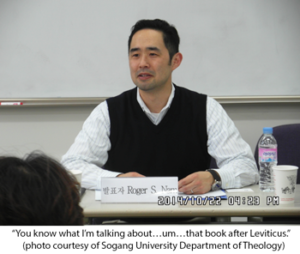
Making Adjustments
Full disclosure: I struggle with the Korean language.
Although I completed an M.Div. degree in Seoul, Korean is still a second language to me. Through an odd combination of reading Korean theology books and listening to 1990s K-pop, I have a decent, albeit strange, vocabulary. But my Korean sentence construction is about as solid as a Jenga tower. My accent is so bad, I’m terrified to order food on the phone, not knowing what will show up at my door.
So when my department chair asked me to lecture in a combination of English and Korean, I performed a reader-centered hermeneutic to equate the chair’s request to really mean 90% English and 10% Korean. After all, Korean education is rapidly globalizing, it will be good for the students to try to listen to a lecture with lots of English, right?
But a few minutes before my department colloquium presentation, in order to accommodate many of the external guests, the chair asked me to lecture in Korean.
I’m sorry, what?
 I looked at my 12 pages of single-spaced notes (in 90% English, of course), and began my presentation on theological themes in Ezra-Nehemiah. But as soon as I started, I could not remember the Korean word for the biblical book of Numbers. I thought to myself, “If I can’t remember biblical books, how will I express a concept like ‘social memory?’”
I looked at my 12 pages of single-spaced notes (in 90% English, of course), and began my presentation on theological themes in Ezra-Nehemiah. But as soon as I started, I could not remember the Korean word for the biblical book of Numbers. I thought to myself, “If I can’t remember biblical books, how will I express a concept like ‘social memory?’”
It was time to make some adjustments.
I skipped any content that was simply too difficult for me to translate. Entire sections of the paper were dropped. To fill the space, I inserted personal stories. It actually felt kinda okay, as the paper centered on the repatriate lives of Judeans as they returned from exile, and I am in the midst of my own repatriate experience. In addition, the room was filled with professors who had studied abroad for years, then returned to Korea. So in the midst of awkwardly stumbling over the text of Ezra-Nehemiah and Persian political history, I would share brief anecdotes about my own family repatriate experience. I talked about my kids’ interaction with other neighborhood children, or trying to figure out the Korean health care system, or my seven (!) trips to the immigration office to register our family as foreigners.
And from my limited perspective, some surprising things happened:
I felt more engaged with the audience.
Going off script meant that I made eye contact with almost everyone. Part of my feeling engaged may be because Koreans tend to be more attentive and respectful to professors, but I sensed that they were genuinely interested in the life of a repatriate Korean American family.
I was more relaxed and natural.
In the first two minutes of the presentation, I looked like a marathon runner during the twenty-sixth mile. But as I settled down through “easy Korean” stories, delivery of the content felt authentic.
They really weren’t interested in theories of social memory…
or post-exilic textual criticism…or Persian period archaeology. I wonder how many times I treat my students like academic colleagues.
They were interested in my story.
In this context, sharing my story allowed the audience to open up and convey their own related experiences. One woman had just returned to Seoul after living in Japan for twenty-three years. Another spoke of her service between first- and second-generation Koreans.
I’m not so self-absorbed to think that all of my students are dying to know about me. But I am reminded that as professors, the knowledge that we present is inextricably tied to our personhood. For this particular lecture, my forced language adjustment was an embodiment of the scholarship in Ezra-Nehemiah that I was trying to share.
Hopefully, it will not take a major linguistic crisis for me to remember this next time. At the very least, my first academic presentation in Korean gives me one more story to add to my narrative.
Very terrific! Thanks for sharing your story. I’m sure many of us have ventured “off script” at some point and have similar positive outcomes when risking “losing control.”
Students love to know that you are REAL and much like them. Thanks for sharing this story, Roger. The lesson learned is a most valuable one.
Dr. Galindo, thanks for your affirmation. It’s good to hear your words from an experienced dean.
Thanks, Dr. Samek. I’m hoping that you can meet with some of these students on your next trip to Asia! I’m wishful that my fluency will only improve by the time spring comes around…